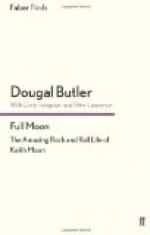“That’s true, ’tis a thought which never crossed my mind.” Thalassa’s look was troubled.
“As you’ve told me this story you’d better leave it in my hands, and not go looking for anybody with that knife of yours.”
“What be you going to do?”
“I must go to Scotland Yard and tell them your story. It’s the only chance.”
“And get me into trouble?”
“There’s not much fear of that. In any case, you must stand that, for Sisily’s sake.”
Thalassa nodded his acquiescence. “Better be careful yersel’ getting back to London. The police here is watching for you. They’ve been a’ Flint House more than once, looking for both of you.”
“It’s a risk I must take, nevertheless,” said the young man, rising from his seat as he spoke. “It’s for Sisily’s sake. Good-bye, Thalassa, and thank you for what you’ve told me.”
Thalassa did not reply or offer to accompany him. From his seat on the rocks he followed Charles’s ascent up the narrow path with contemplative eyes.
CHAPTER XXIX
Barrant returned to London in the mental disposition of a man who sees an elaborate theory thrown into the melting-pot by an unexpected turn of events. The humbling thought was that he had allowed a second fish to glide through his hands without even suspecting that it was on his line. He had never remotely connected Charles Turold with the murder until Mr. Brimsdown had imparted Mrs. Brierly’s disclosure to him. He had acted promptly enough on that piece of information, but once again he was too late.
Austin Turold might have felt reassured if he had known how little his share in the events of that night occupied Barrant’s mind during their last interview. The complexion Austin’s conduct bore to the detective’s reflection was that of a father who had intentionally misled the power of authority in order to shield his son. The law took a serious view of that offense, but it was a matter which could be dealt with at leisure in Austin’s case. By his brother’s death Austin Turold had become a man of property and standing. It was the drawback of his wealth that he could not disappear like his son. He was to be found when wanted. The main thing just then was to catch the son, or the girl—or both. Barrant went back to London for that purpose.
As the days slipped away without that end being achieved he became worried and perplexed. His own position was an unenviable one, and his thoughts were far from pleasant. He felt that he had failed badly, and that his standing with his superiors in Scotland Yard was under a cloud in consequence. But he could not see where he had actually been at fault. It was such a damned amazing case. In most crimes the trouble was to find sufficient clues, but in this case there were too many. And the inferences pointed different ways. That was the trouble. He was not even sure that in this latest discovery,




